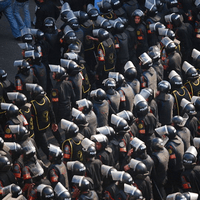There's a lot of trepidation mixed in with the joy of seeing one of the Arab world's great dictators finally step down. With Americans being so down on themselves these days, many see more to fear than to celebrate. But on the whole, there's no good reason for the pessimism on display, which is based on a lot of specious assumptions that need to be discarded. Here's my Top 10 list.
1) Mubarak's quick-exit scenario means this is Iran, 1979. Nonsense, with the key reasons being the deft play by the Egyptian military and its deep and long relationship with the U.S. military, itself a quiet winner here. By stepping in at just the right moment, when the accumulated signals sent by ousted President Hosni Mubarak and his hand-picked vice president, Omar Suleiman, suggested that they felt the old regime still had some legs, the Egyptian army confirmed the people's trust in it as the nation's natural guardian. That is not the Iranian/Revolutionary Guard path, but the Turkish one. So far, the military is giving plenty of signs that it'll meet the people's demands -- in terms of dissolving parliament and revising the constitution -- but on a reasonable schedule, with elections in six months. Most crucially, the military has stated that all of Egypt's previous treaties, including those with Israel, remain in effect.
2) The United States has already lost, primarily because Obama spoke up late. President Barack Obama was balancing a lot of equities in his string of responses to date, including long and close relationships with Israel and Saudi Arabia, neither of whom wanted this rapid-fire outcome. There will be plenty of time to prove our worth in the months ahead. Yes, a truly democratic Egypt will be an immense pain in Washington's neck, demanding all sorts of attention. But in the end we'll have a more useful ally -- again, like strong-willed Turkey or even future oil giant, Iraq. How so? The sheer force of Egypt's example will do more to reconfigure the region than all the blood and treasure we've spent in the Long War to date. On this score, all you need know is that Egyptian soap operas and serials are the most popular TV shows in the Middle East, although Turkey's are catching up fast. The most effective U.S. soft power in the region is that wielded by its friends.

